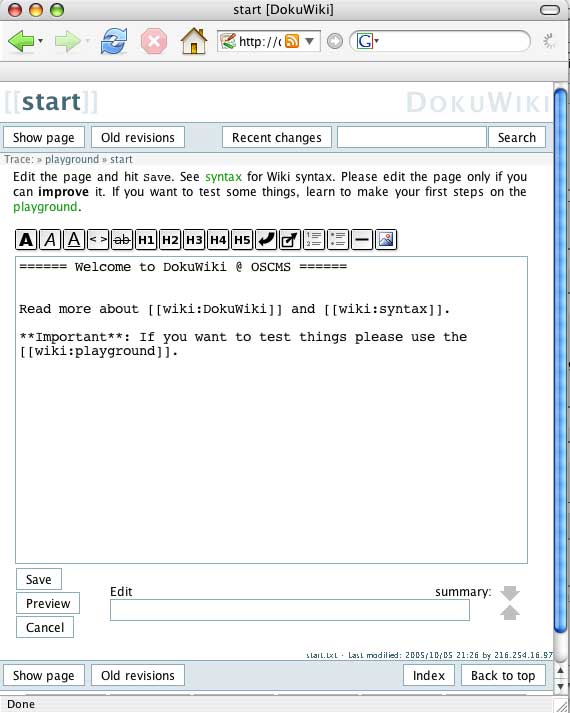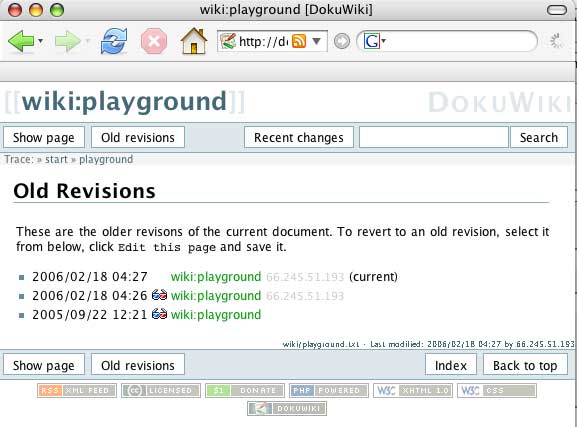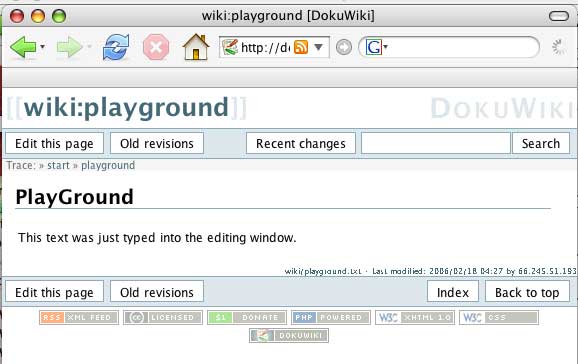Comparative Analysis with Wiki software
The Geneboree annotation system can be thought of as a wiki. Wikis offer collaborative, asynchronous development of detailed knowledge via a web browser. Similarly, our system will be designed to offer collaborative, asynchronous annotation of gene functions via the web. By simplifying text entry, wikis lower the barrier of technical know-how that would otherwise prevent easy, widespread sharing of knowledge via the web, leveraging the input of large numbers of people to generate reliable, complete data. As an example, Fig. 1 shows the simple editing page offered by DokuWiki. The Geneboree system will not be text based to the same extent as a typical wiki, but it will simplify data entry by presenting an interface that is customized for gene annotation. It will also provide a simple interface for entering comments about annotations.
Fig. 1 DokuWiki editing page
The single most significant "feature" about a wiki is the wiki approach to collaboration, which calls for a cultural shift in thinking about ownership of documents. Many people are uncomfortable changing someone else's text, even if they know it to be erroneous, and many find it hard to trust others to edit their work. Wikis overcome these concerns by trackinging changes and attributing authorship of changes. (See Fig. 2 for an example of change tracking in DokuWiki and Fig. 3 to see a sample page with author attibution, here referencing an IP address because the author wasn't logged in.) These two features address the needs of our user personas very well. Our personas all share the goal of obtaining reliable functional information about genes. It is clear that, in order to do so, they need to see the sources of the functional data and they need to be able to review the history of thought about each functional assignment in order to evalute its usefulness. Thus, these aspects of a wiki transfer very well to the Geneboree system.
Fig. 2. DokuWiki revision history for a page
Fig. 3. Sample DokuWiki page with simple function buttons and author information below the text area
Wikis have suffered in the press in recent months with the admission of one contributor to the wiki flagship application, Wikipedia, of having faked an entry. The outrage that this admission has caused is itself a testament to the viability of the wiki approach, though many individuals consider wikipedia information suspect because of its lack of controls. Applying the wiki concept to scientific work may provoke similar suspicions among scientists, who demand rigor from their data sources. Still, the scientific community actually behaves very much like a wiki community already. Research results are published in open literature. Consensus is developed via collaboration and information sharing, and the ultimate arbiter of the value of one's published work is the consumer. Scientific communities avoid direct criticism and outright rejection in favor of individual assessments of validity and successive refinement of knowledge. To ensure editing only by approved participants, some wikis allow the administrator to implement access controls, requiring a user to sign in before editing pages. Users without a login can still view wiki pages, but they cannot edit them. This feature would facilitate the attribution of source that our personas look for and could be used to prevent nonexperts from attempting to annotate. Allowing viewing by anyone and updating by experts maps well to the uses of open literature.
In the course of their work, scientists communicate with colleagues frequently, often by email, but updates to functional information about genes are hampered by dependence on a single busy individual who "owns" the data or by the tradition of releasing a knowledge product as a discrete version. Wikis allow immediate updating of a knowledge product as soon as an error is detected. They also offer email or RSS-based notification of updates, which would help our user personas stay on top of developments in their fields.
Interestingly, it appears that at least some members of the genomics community are already thinking along the same lines that we are. A recent opinion piece in Nature espoused the idea of a wiki for gene function. (http://www.nature.com/nature/journal/v439/n7076/full/439534a.html, Nature 439, 534 (2 February 2006) | doi:10.1038/439534a)